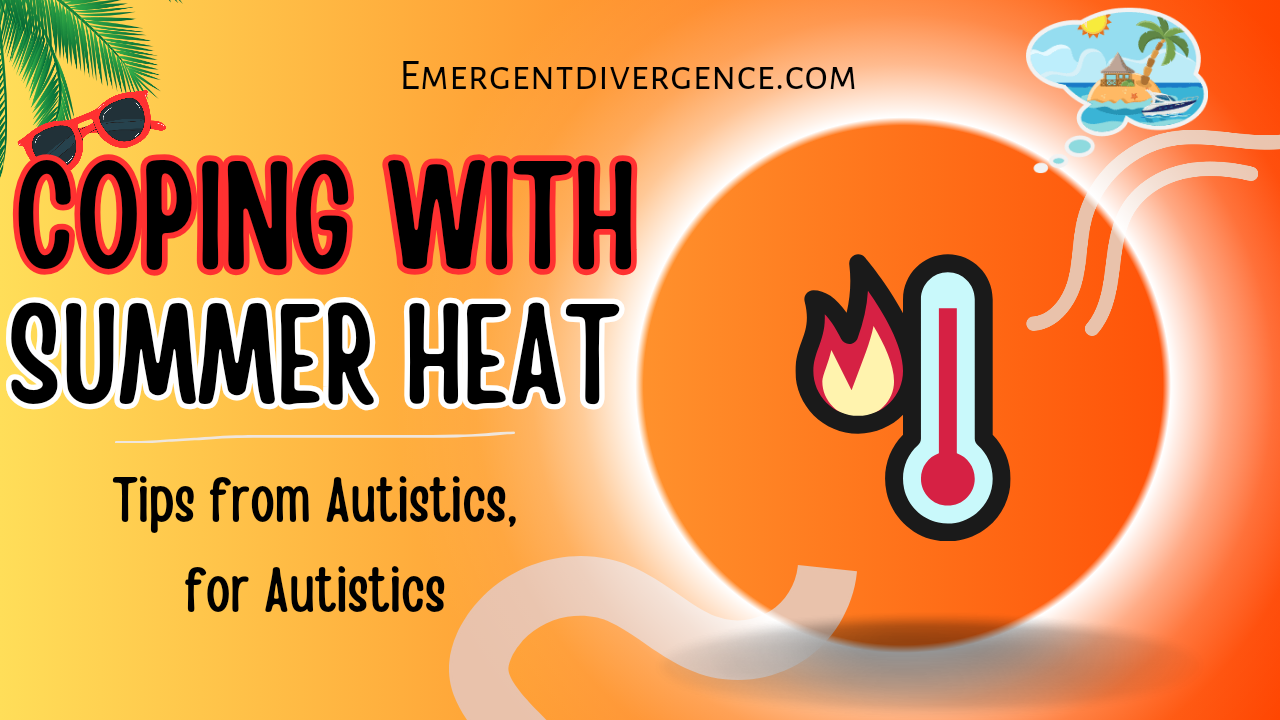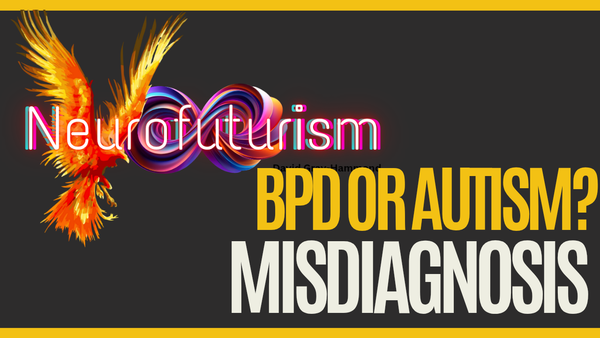Coping With The Summer Heat: By Autistics For Autistics

It's summer in the northern hemisphere, which can mean only one thing; we're all overheated and overstimulated. Give our changing weather. It's likely that these hot summers will continue, or even get worse. So, I felt it necessary to ask the Autistic community of X/Twitter how they survive the heat. I will be sharing their tweets and adding a little of my own insight into the conversation.
The effect of heat on Autistic people
While research into thermal sensitivity and temperature regulation in Autistic people has been largely inconclusive (Casterman et al, 2024), it is anecdotally noted that Autistic people tend to fall into one of three camps:
- Autistic people who prefer what would be considered unusually cold temperatures. This group tends to struggle with the heat of summer.
- Autistic people who are sensory averse to cold temperatures. This group tends to cope better in warmer temperatures.
- Autistic people who can not cope with either temperature extreme.
Rosie Weldon (2021) discusses how summer heat impacts them as an Autistic person. They highlight that a primary challenge can be the need to alter clothing away from items that are considered safe by the Autistic person. They also highlight that excessive heat can also antagonise food and drink intake, which is particularly problematic where dehydration is a risk. Weldon also mentions sensory overload which seems to be a regular theme in online discussions of this topic.
The person in the above tweet highlight that they become "more irritable, anxious, annoyed, and uncomfortable." Which are all common responses to sensory overload (as reported by Autistic people). I would also note that exposure to heat may also be dangerous for some Autistic people because of its overloading effect impacting on our focus and attention.
Keeping note of our needs in the summer heat
This response was an important starting place for two important but contradictory reasons;
- Incorporating hydration and self-assessment into our summer routine can be the difference between feeling too hot, and experiencing more dangerous thing like heatstroke.
- Not all Autistic people can do this.
Some Autistic people are great with routines, some are not; particularly AuDHD'ers (Autistic and ADHD people). It should also be noted that many Autistic people have differences in their interoceptive sense that can make it difficult to notice thirst or assess your needs at any time of the year.
Despite this, forming a habit of regularly drinking water (and assessing if their are other needs arising from the heat of summer) can go a long way in preventing the more frightening outcomes of living in high temperature. Something that may help is having a third party deliver reminders of these things, be that a human or a calendar of some sort.
Be aware of medication side effects
Many Autistic people are on various medications. It's particularly relevant to highlight that CNS stimulant medications such as methylphenidate may raise core body temperature (Docherty & Alsufyani, 2021) creating dangerous situations in the heat.
Medications like stimulants or diuretics may make your body use up water faster. It's important to maintain a good level of hydration throughout the day as this will be accelerated by high temperatures.
Something else that is often forgotten is that some medications make you more sensitive to UV radiation. For example, doxycycline (an antibiotic) combined with exposure to the summer sun can result in serious sunburns that may require medical treatment. More than anything, always make sure to listen to the advice of the prescribing doctor with regards to medication and summer safety.
Climate Control for Autistic people
I want to break this into two sections;
- Immediate cooling of the body
- Wider environmental controls
Immediate Cooling
This can cover a wide range of things, but essentially involves using cooling items in close-contact with skin.
This might sound a little out of left field, but dog cooling mats are actually quite effective. Sleep is an area that can be significantly effected by high temperatures, so adding this sort of thing to your sleeping environment could be a significant improvement. Personally, I can not sleep if I am overheated, in particular if my feet are hot.
Frozen socks could be a good answer for people who have similar problems to me as they provide some sensory relief (provided you can tolerate the cold) and will temporarily lower the body temperature.
Finally, another awesomely Autistic approach to cooling down your body in the heat;
This suggestion again requires you to be able to tolerate the cold, but could absolutely help during those exceptionally intolerable heatwaves that are becoming less and less of a rare event.
This kind of cooling can really help battle some of the sensory overload that comes with extreme heat, but isn't necessarily a long-term solution. To make a longer lasting result, we have to make changes to our broader environment.
Wider Environmental Cooling
The two that stood out to me were staying inside, and using air conditioning. Staying inside is good advice for anyone faced by extreme heat, but AC is a little more complicated. If, like me, you live in a country where AC is not a standard fixture or perhaps it is too expensive for you to access, then there are alternatives.
Fans can be an effective alternative to AC, but they need to be used right. Personally, I use a tower fan that is not blowing directly on me. While this isn't as effective as air conditioning, it can make the summer more tolerable, and personally helps me sleep. I also find the white noise of a fan helpful, although this isn't for everyone.
Keeping blinds and curtains closed can be very effective as it blocks the sun's rays from entering a building. I would also note keeping windows closed as heat will move into cooler environments. If the temperature is high, open windows will actually let the heat in. It sounds counter-intuitive, but it helps.
Whatever the weather, staying cool in the summer should be a priority for Autistic people who don't want to melt into a sensory overloaded puddle on the floor. It's important not only for our physical health, but our emotional wellbeing and ability to perform daily functions. Not everything will work or be practical for everyone, but hopefully this has provided some useful suggestions. There are even more on the main thread on X/Twitter.
And if all else fails, you could always move to a colder country.
References
Casterman, N., Rossignol, M., Colomar, A., & Cassioli, F. (2024). Thermoception in Autism Spectrum Disorder: A Concise Systematic Review. Review Journal of Autism and Developmental Disorders, 1-9.
Docherty, J. R., & Alsufyani, H. A. (2021). Cardiovascular and temperature adverse actions of stimulants. British Journal of Pharmacology, 178(13), 2551-2568.
Weldon, R. (2021). Autism in a heatwave. rosiaweldon.com. https://rosieweldon.com/heat/


